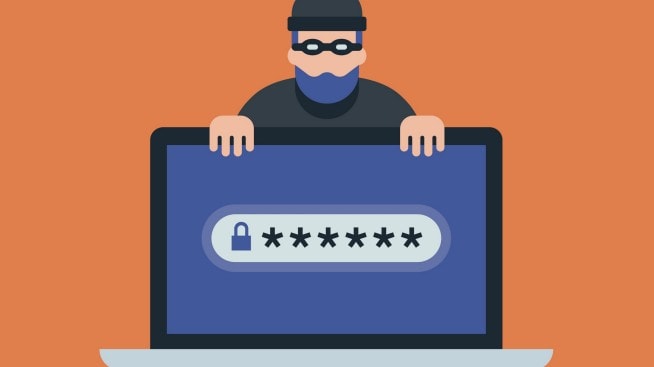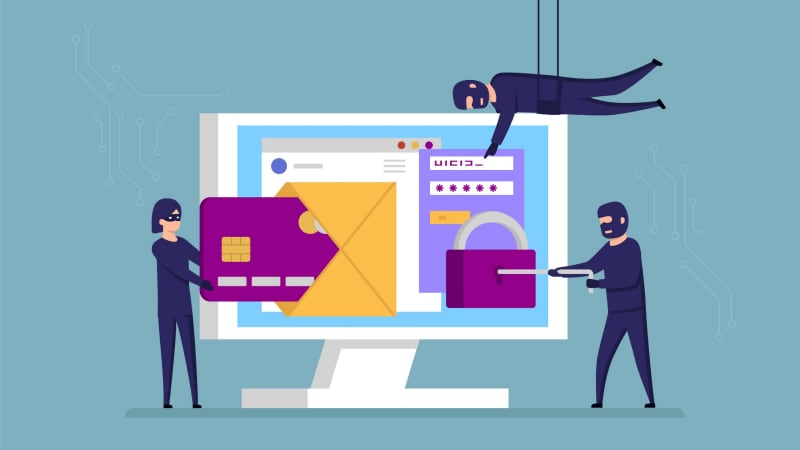Types of identity theft and fraud

At some point during your lifetime, you or someone you know may have some form of information stolen. Whether that's a credit card, a Social Security number (SSN) or other piece of identifying info, identity theft and fraud is far too common.
That's why it's essential to be aware of this ongoing problem and take proactive steps to help secure your identity. With some simple but essential knowledge, everyday vigilance and the help of modern tools like Chase Credit Journey®, you can take steps towards securing your personal information and be better prepared for potential illicit activity designed to steal your personal information.
In this article, you will learn about some different types of fraud that exist so you can keep your eye out for any warning signs. What's more, we'll equip you with examples of identity theft so you can better understand what to look for and how to protect yourself against it.
Account takeover fraud
When someone gains access to accounts and makes changes to them — like requesting a new credit card or adding authorized users to a credit card account — this is known as account takeover fraud. According to Experian™, a few examples of this type of fraud include when individuals:
- Buy a new smartphone using your phone's carrier
- Access and redeem rewards or points from various accounts
- Open a bank account under your name
- Online shop with your information
Credit card and debit card fraud
As the name implies, credit card and debit card fraud happens when a bad actor steals your card's information to get access to your funds. This can happen in a few different ways. For example, your information could be hacked into if you used an unsecure website, public Wi-Fi or through a scanner on a card reader at a gas station. Another example would be if someone steals your physical cards and begins making purchase with them.
Online shopping fraud
Shopping online may look convenient, especially when there are features like autofill that save your information and make checkout faster. However, shop online with caution, in secure websites to help avoid someone hacking into your account and making purchases with your saved credit card information, even redeeming your points and offers.
Mail identity theft
Your mail may contain lots of sensitive information that someone could steal and use against you. For example, if you receive health insurance claims or credit card bills in the mail, a bad actor can steal this paper work and your identity. Additionally, think twice about throwing away paperwork — consider shredding documents before putting them in the trash so someone can't dig through and steal them.
Social Security Number (SSN) identity theft
Your SSN is perhaps one of the most important pieces of information to gain access to all sorts of things — whether that's bank accounts, online accounts, health insurance cards and more. Social Security identity theft happens when someone steals this unique number assigned to you to gain access to all kinds of personal information. It's good practice to have your number memorized, keep the physical card in a safe place at home and only do business or take calls involving your SSN info in a safe, private environment.
Senior identity theft and scams
Senior identity theft happens when people prey on older individuals. They are vulnerable to scams and having their identity stolen it is usually a fact that they might not be as well equipped or savvy to look for things like phishing scams or other online attacks.
Child identity theft
Children are also vulnerable to having their identities stolen, often without realizing it. Tragically, this is often a crime that produces consequences later in life. For example, an individual could steal a child's SSN to open up a bank account before they are old enough to take out an account on their own.
Tax identity theft
Criminals may want to steal your identity in order to benefit themselves by stealing your tax refunds, dipping into government programs and more. For example, they may steal your SSN or participate in employment identity theft in an effort to steal your tax refunds.
Biometric identity theft
While today's world allows us to protect our information using high-tech tools like fingerprints or face recognition, it's still possible for a criminal to steal your fingerprints and gain access your personal info with it. For example, someone could steal your identity by hacking copies of your fingerprints or use a picture of your face to gain access to your devices.
Medical identity theft
Remember when we talked about shredding your paperwork? You'll want to do that especially when it comes to your medical information, and not just documents. Pill bottles or bills for prescriptions can also be stolen as part of medical identity theft. By stealing your information — whether it's physical copies or online — a perpetrator can submit medical claims in your name, get access to medications and more.
Home title fraud
Do you and/or your spouse own a home? Take active measures to keep your property's documentation safe. According to Experian, homeowners don't always realize they've fallen victim to home title fraud until after the fact. A scammer may steal your property by forging a deed/transferring ownership. It's possible that you could start receiving letters from a lender indicating the foreclosure of your home, all because a criminal was able to use your home as collateral for financial purposes like taking out loans.
Mortgage fraud
While they sound similar, home title fraud and mortgage fraud differ. Mortgage fraud happens when a homebuyer, seller or lender skews or hides important details that could lead to terms and conditions of a mortgage loan that don't allow you to qualify. Criminals commit this fraud for both profit and for housing purposes by stealing from you, lenders or other parties involved in the mortgage.
Lost/stolen ID or passport
Always be sure you know where your passport, license and/or state identification card is located. Your passport contains key information that a criminal can use against you or sell it on the dark web, an online network where criminals can buy and sell stolen information. If you lose your passport/ID or believe someone has stolen it, report this right away by submitting a form with a new DS-11, which states that you've lost your passport or had it stolen.
Internet of Things (IoT) fraud
The IoT is an online network of objects that have sensors/technology to connect and share data with other devices. Criminals could access this and take actions that benefit them — whether it's selling your information online, getting access to your bank accounts or more.
What you should do if you've become a victim
Finding out you've been a victim of identity theft is unsettling and worrisome — especially when there are so many different types of identity theft and fraud out there. While it can feel daunting to think of all the ways a criminal could steal your information, you can replace that feeling with empowerment by being vigilant, savvy and protected.
If you just realized you've been a victim of identity theft, you'll want to take action immediately. Here are some things you can do:
- Contact your issuer — If you're dealing with credit or debit card fraud, contact your issuer right away to correct any errors, dispute transactions and freeze existing accounts.
- Contact the credit bureaus — Reach out to one of the three bureaus (Experian™, Equifax® or TransUnion® ) to confirm your identity and correct any errors on your credit report.
- Report the theft to the authorities — Fill out an identity theft report with the Federal Trade Commission (FTC) at IdentityTheft.gov. The FTC is a federal law enforcement agency where you can inform/report that you are the victim of identity theft. They may be able to further assist you, such as blocking attempts to open new accounts in your name.
How identity monitoring can help prevent identity theft
While it's impossible to stop identity theft from happening entirely, you can help protect your identity by for example enrolling in Chase Credit Journey's identity monitoring services. Receive notifications about data breaches or suspicious activity regarding your sensitive information. You'll also receive services including dark web surveillance and SSN tracking.
Bottom line
Identity theft and fraud is an ever-increasing problem with unfortunate consequences. Fortunately there are plenty of ways to help prevent theft from happening by taking measures and actionable steps. Protect yourself today by monitoring your credit and identity with Chase Credit Journey.



